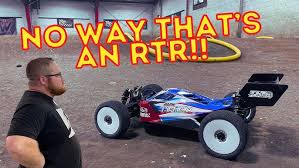The Importance of Community Support in the RC Racing World
Radio-controlled (RC) racing is not just a hobby; it’s a community that thrives on camaraderie, passion, and support. Within the world of RC racing, enthusiasts come together to share their love for the sport and help each other grow and succeed. Community support plays a crucial role in fostering a positive and inclusive environment for racers of all levels.
Sharing Knowledge and Expertise
One of the key aspects of community support in RC racing is the sharing of knowledge and expertise. Experienced racers often mentor newcomers, offering valuable tips and advice to help them improve their skills. Whether it’s tuning a car for optimal performance or mastering complex racing techniques, the RC racing community is always willing to lend a helping hand.
Building Friendships and Connections
RC racing events are not just about competition; they are also opportunities to build friendships and connections with like-minded individuals. The sense of camaraderie that comes from bonding over a shared passion for RC racing is invaluable. Through mutual support and encouragement, racers forge lasting relationships that extend beyond the race track.
Encouraging Inclusivity and Diversity
Community support in the RC racing world also plays a vital role in promoting inclusivity and diversity. Racers from all backgrounds, ages, and skill levels are welcomed with open arms, creating a welcoming environment where everyone feels valued and respected. By embracing diversity, the RC racing community enriches itself with different perspectives and experiences.
Supporting Local Clubs and Events
Local RC racing clubs play a significant role in nurturing the growth of the sport at grassroots levels. Community support for these clubs is essential for their sustainability and success. By participating in club activities, volunteering at events, or simply cheering on fellow racers, enthusiasts contribute to the vibrancy of the local RC racing scene.
A Culture of Support and Encouragement
In conclusion, community support is at the heart of the RC racing world. It creates a culture of support, encouragement, and unity among racers worldwide. By coming together to share knowledge, build friendships, promote inclusivity, and support local clubs, enthusiasts ensure that the spirit of RC racing continues to thrive for generations to come.
Understanding the RC Racing Community: Key FAQs Answered
- What does RC stand for in RC racing?
- What was the first RC car ever made?
- Is RC Racing a sport?
- What are the benefits of RC racing?
What does RC stand for in RC racing?
In the world of RC racing, the term “RC” stands for “radio-controlled.” RC racing involves the use of radio-controlled vehicles, such as cars, trucks, and drones, that are operated remotely using a radio transmitter. These vehicles are equipped with electronic components that receive signals from the transmitter, allowing racers to control their movements and speed. The acronym “RC” highlights the fundamental technology behind these exciting racing machines and signifies the unique thrill of competing in high-speed races with precision-controlled vehicles.
What was the first RC car ever made?
The question “What was the first RC car ever made?” is a common query among enthusiasts in the RC racing community. The first radio-controlled car, often credited to be the “Phantom Corsair,” was introduced in the late 1960s, marking a significant milestone in the history of RC vehicles. This groundbreaking invention paved the way for the development of modern RC cars and ignited a passion for remote-controlled racing that continues to thrive within the community today. Understanding the origins of RC cars not only sheds light on their evolution but also highlights the enduring legacy of innovation and creativity within the world of RC racing.
Is RC Racing a sport?
The question of whether RC racing qualifies as a sport is a topic that often sparks debate within the RC racing community. While some may argue that traditional sports involve physical exertion and athleticism, others believe that the skill, strategy, and competitive nature of RC racing make it a legitimate sport. Regardless of the classification, one thing is certain: the passion and dedication shown by RC racers demonstrate that it is much more than just a hobby. The sense of camaraderie, sportsmanship, and community support found in RC racing further solidify its status as a respected activity that brings enthusiasts together in pursuit of shared goals and enjoyment.
What are the benefits of RC racing?
Engaging in RC racing offers a multitude of benefits that extend beyond the thrill of competition. Firstly, it provides a platform for individuals to hone their hand-eye coordination, reflexes, and strategic thinking skills. Additionally, RC racing fosters a sense of camaraderie and community spirit among enthusiasts, creating opportunities for social interaction and friendship building. The hobby also serves as a stress-reliever and a source of enjoyment, allowing participants to unwind and have fun while pursuing their passion for remote-controlled vehicles. Overall, the benefits of RC racing encompass physical, mental, and social aspects, making it a rewarding and fulfilling pastime for individuals of all ages.

